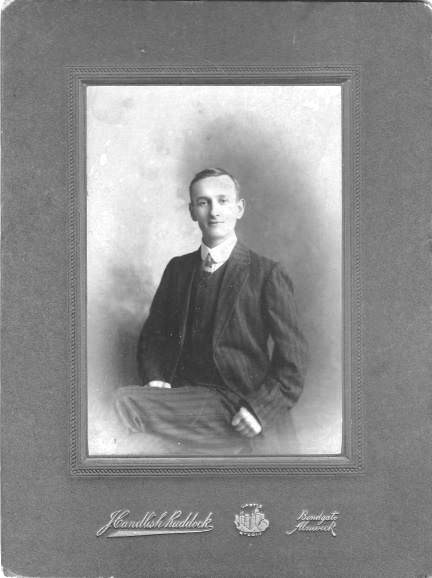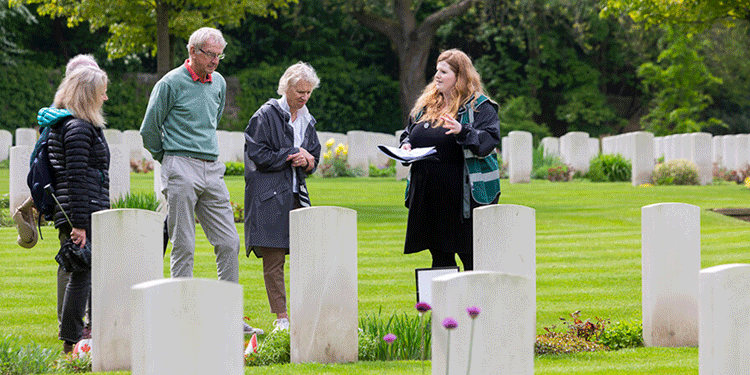
Matthew Williamson Taylor’s parents, William and Esther, married in Alnwick, Northumberland in August 1887. They had 8 children, although one died in childhood, and by the time of the 1911 census they were living in Bondgate in Alnwick with their 4 sons and 3 daughters.
Fittingly, William Taylor, the father, was a tailor by trade, although in previous censuses he had described himself as “tailor and professional musician”. Matthew was the third child and third son of the family (all four boys being born before the daughters). He was born on 3rd November 1893 and was educated at the Duke’s School in Alnwick where he won awards for science and art and played in the 1st XI football team. He left school in 1907 and by 1911, aged 18, he was working as a solicitor’s clerk in Alnwick.
Matthew’s three brothers had diverse employment. The eldest, William Heywood Taylor (aged 22), was a house painter, George (20) worked for a firm making fishing reels and the youngest brother, Norman (16) was an assistant to a watchmaker.
War was to interrupt all their careers and take them away from Alnwick. Not all of them would return.
Matthew and George both joined their local regiment, the Northumberland Fusiliers, soon after the outbreak of the First World War. Norman followed them when he turned 18 two years later, and William became a mechanic in the Royal Naval Air Service.
Having completed their training, Matthew and George travelled to Belgium with the 7th battalion of the Northumberland Fusiliers in April 2015. Just 9 days before leaving for the front, Matthew got married to Eleanor (Nellie) Snowden in Alnwick. Matthew had the rank of Sergeant and George was a regimental drummer.
They crossed the channel from Folkestone to Boulogne overnight, arriving in France at 8am on the 21st. The following day, they moved by train to the Belgian border and from there marched on foot to the trenches South of Ypres.
Matthew’s diary for April 25th 1915, says;
"Marched to Ypres, the most treacherous part of the whole battle front. We arrived here about 10.30 p.m. and got our first baptism of fire. Shells were flying in all directions, houses and churches burning. We proceeded a few miles further on in pouring rain."
The next day Matthew recorded his first experience of attacking across no-man’s land.
“Waited, drenched to the skin till daybreak when we made an attack on the enemies’ trench. My God, it was hell upon earth, shells bursting all around us, men lying kicking and screaming wounded, others lying quite still teaming with blood. However, we kept driving the enemy back and after going a good way we took up defensive positions and dug ourselves in. At time of writing, we are waiting for a German attack. I feel very cold, thirsty and hungry. To make things worse I fell in a pool of mud & water up to my armpits. My clothes will have to dry on me.”
The following day, April 27th he wrote,
“Most terrific fighting without moving an inch.”
Matthew’s brother George, returned to Alnwick after he was wounded by a bullet which damaged his right lung and would have killed him if it had not hit his scout’s knife.
Matthew fought on and in July moved with his battalion across the border to Armentieres in France, where they were billeted in the asylum. The following week the battalion was on trench duty on the outskirts of town. It was a very quiet part of the front after the “hell on earth” around Ypres – no large battles, just the everyday attrition of trench warfare.
The battalion diary reports casualties during the 4-day period of front-line duty as “1 killed, 2 wounded”. The single fatal casualty was Matthew Taylor on July 22nd.
According to a letter sent home by a friend,
“We had just had breakfast together and went down the line on trench duty when he saw some Germans. He got up to fire at them and killed two, but he stayed on the top too long and a sniper got him with one of those exploding bullets.”
Matthew Taylor was buried in the local French cemetery at Houplines. After the war, in 1920, the military burials there were exhumed and transferred to the Strand Military Cemetery just across the border in Belgium.
He was posthumously awarded the British War Medal and Victory Medal, along with the 1914-15 Star (awarded to soldiers who had entered an 'Active theatre of War' prior to 1/1/1916).
He is commemorated in Alnwick on a bronze plaque in the Northumberland Hall, on a roll of honour in St Michael’s Church, on a plaque at the former Duke’s School and on the Alnwick war memorial. (on the last two his name has the initials reversed and reads as Taylor, W M.).
Matthew’s three brothers all survived the war and returned to civilian life in Alnwick, all of them eventually marrying. Matthew’s widow, Nellie, also lived on in Alnwick after the war but did not re-marry.






